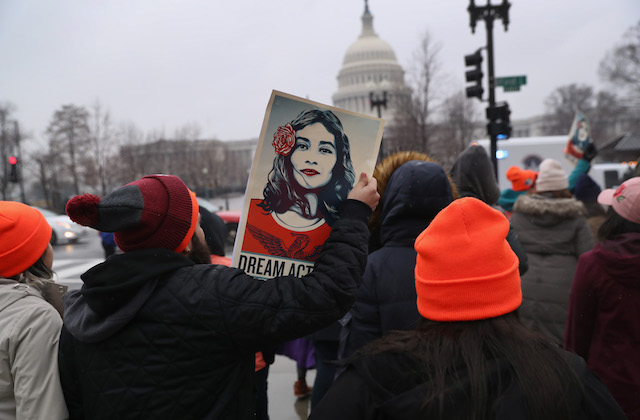Second Federal Judge Blocks Trump From Rescinding DACA

A federal judge on Tuesday (February 13) temporarily blocked the Trump administration from ending Deferred Action for Childhood Arrivals (DACA).
U.S. District Judge Nicholas Garaufis ruled that the Trump administration can technically rescind DACA, which protects some 700,000 young immigrants from deportation, but that the reasons Attorney General Jeff Sessions gave in September for ending the program were too discretionary and could not stand.
The judge's ruling read, in part:
The question before the court is thus not whether defendants could end the DACA program, but whether they offered legally adequate reasons for doing so. Based on its review of the record before it, the court concludes that defendants have not done so…. To the extent the decision to end the DAGA program was based on the attorney general's determination that the program is unconstitutional, that determination was legally erroneous, and the decision was therefore arbitrary and capricious.
Last month, a federal judge in California echoed judge Garaufis' ruling, issuing a nationwide injunction to keep DACA in place while litigation contesting Trump's decision works its way through the courts.
Yesterday's decision represents another victory for 16 attorneys general who immediately challenged Trump's order in September, arguing that it was driven by racial hostility toward immigrants and Latinx people. Tuesday's ruling also means that DACA recipients can continue to renew their status, though the federal government does not have to accept new applications.
"Today's ruling shows that courts across the country agree that Trump's termination of DACA was not just immoral, but unlawful as well," Karen Tumlin, of the National Immigration Law Center, told CNN.
Department of Justice spokesperson Devin O'Malley told press that the Trump administration's position is that DACA was implemented unilaterally by the Obama administration. "As such," he said, "it was an unlawful circumvention of Congress."
Arguing that the Obama-era program was unconstitutional, Sessions announced on September 5 that it would gradually end DACA and encouraged Congress to take up the issue. Since that date, the Department of Homeland Security has stopped accepting renewal applications for DACA, which shields young immigrants from deportation allows them to study and work in the United States legally.
Shortly after the first injunction in January, Trump administration officials asked the Supreme Court to address the lower court's decision. The high court is scheduled to meet on Friday (February 16) to decide if it will consider the administration's appeal.
Tuesday's ruling also comes as the Senate debates a legislative solution for DACA recipients. But several Democrats have already said they will not support President Trump's immigration framework, which opens a 10- to 12-year path to citizenship for some 1.8 million young immigrants, while providing $25 billion for a border wall, eliminating the diversity lottery program and restricting family-based migration.
On Monday (February 12) night, the Trump administration said it is unwilling to budge on these demands, telling Axios that Trump "will veto any bill that does not advance his common sense immigration reforms."
